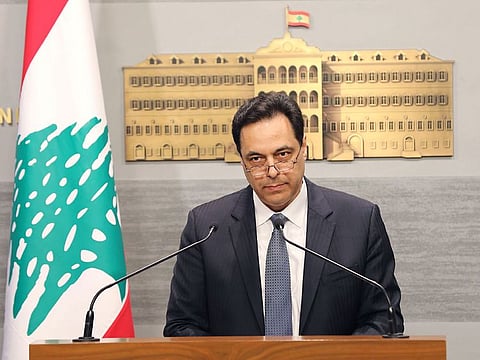Lebanon faces a very grim future
No serious reforms can be made in the country unless there is political stability

Also In This Package
Lebanon’s talks with the International Monetary Fund are not going well. Started in May, the aim is to secure a $9-10 billion loan for the cash-strapped economy.
Last week, the chief adviser to the talks resigned, citing “no genuine will” to reform the country, admit the scale of its losses, or restructure its collapsing banking sector.
The government of Prime Minister Hassan Diab says that the losses amount to $83 billion, a figure challenged by the Central Bank and Parliament Speaker Nabih Berri, who is at daggers-end with the premier, despite both being Hezbollah allies.
Hassan Diab is both unable — and unwilling — to go down that road. In fact, no Lebanese premier has been able to achieve that since the resolution was issued back in 2006, not even those far more powerful than Diab like Saad Al Hariri or Fouad Al Siniora
Diab authorised the IMF talks after losing all hope at unblocking the $11 billion promised to Lebanon in France back in 2018, in what was known as the Cedar Conference.
He needs money — plenty of it — to pay for salaries, which cost $6 billion annually, wheat importation ($110 million annually), medicine ($1 billion annually) and petroleum ($3.7 billion).
Japan has expressed a willingness to consider helping but only if Lebanon extradites Carlos Ghosn, the ex-CEO of Nissan Motors who is now based in Lebanon after fleeing Japanese justice last year.
Difficult conditions
Other countries have made more difficult conditions, however, like combating corruption, bringing wrongdoers to justice, reforming the state apparatus, and most importantly, implementing UNSCR 1701, which calls for the disarmament of Hezbollah and pushing its forces out of their strongholds in the Lebanese South.
Hassan Diab is both unable — and unwilling — to go down that road. In fact, no Lebanese premier has been able to achieve that since the resolution was issued back in 2006, not even those far more powerful than Diab like Saad Al Hariri or Fouad Al Siniora.
The IMF itself doesn’t seem too enthusiastic about the Lebanon talks, facing far more global challenges with Covid-19, which has consumed $250 billion of aid across the planet. Many of the countries that have applied enjoy a far more stable scene than Lebanon.
The fact that Lebanon has already defaulted on its sovereign debt since March 2020 is already turn-off for the IMF. So is the free-fall crash of the Lebanese currency, now trading at 4,000 Lebanese Pound to the American dollar, up from just 1,500 Lebanese Pound in September.
No serious reforms can be made unless there is political stability, and no stability will happen unless Hassan Diab calls for early elections.
Early Elections
That will not happen so long as President Michel Aoun is in power, since members of his Free Patriotic Movement (FPM) are categorically opposed to early elections. They fear that an early vote will erode their current parliamentary majority (29 out of 128 seats).
Their fears are not unfounded. When Lebanese youth took to the streets last October, a common denominator of hate was Aoun’s son-in-law Gibran Basil, then-foreign minister, accused of corruption and misuse of public of office. Most of Diab’s ministers are political newcomers who owe their fortunes to Basil, however, who literarily hand-picked them for their job.
The Prime Minister would never cross him and unless signed off by the President, no early elections can happen. This means that the Lebanese are stuck with Hassan Diab for what remains of Aoun’s term, which ends in October 2022. Fears of a disintegration at a political, security, and economic level remain.
Hariri wouldn’t allow it, already moving heaven and earth to see the end of Diab. He never expected the current premier to last this long. The Diab government was supposed to be a caretaker one only, yet the Covid-19 breakout extended its life by three months.
Diab has been silently removing Hariri proteges and appointees from the Lebanese civil service, replacing them either with independents or Hezbollah-backed Sunnis. The longer he lasts, the stronger his campaign will be against Harirism, eventually accumulating with the creation of an Iran-backed Sunni political party, aimed at challenging the Future Movement within its own constituency.
Back on the street
Until that happens, however, people are back on the street after a three-month Covid-19 lockdown. They are angry, torching banks and being fired at by policemen. A law making it illegal to criticise President Aoun only added to frustration, in a country once famed for its freedom of speech.
Sectarian rhetoric is at its peak. Hezbollah has taken a firm decision not to get dragged into a confrontation, however, despite provocation. It fears an uncontrollable chaos will bring down the Diab government, which it wants to maintain, against all odds.
But Hezbollah’s street, just like everybody else in Lebanon, is penniless, jobless, and hungry. The violence is expected to increase as living conditions worsen, however, plunging the country into the unknown.
Can Hassan Diab navigate in such difficult waters? What if the IMF talks collapse and it becomes clear to the Lebanese that they are on their own and should expect no money from anyone?
How then will the street respond and what will Prime Minister Diab tell the people?
— Sami Moubayed is a Syrian historian and former Carnegie scholar. He is also author of Under the Black Flag: At the frontier of the New Jihad.









